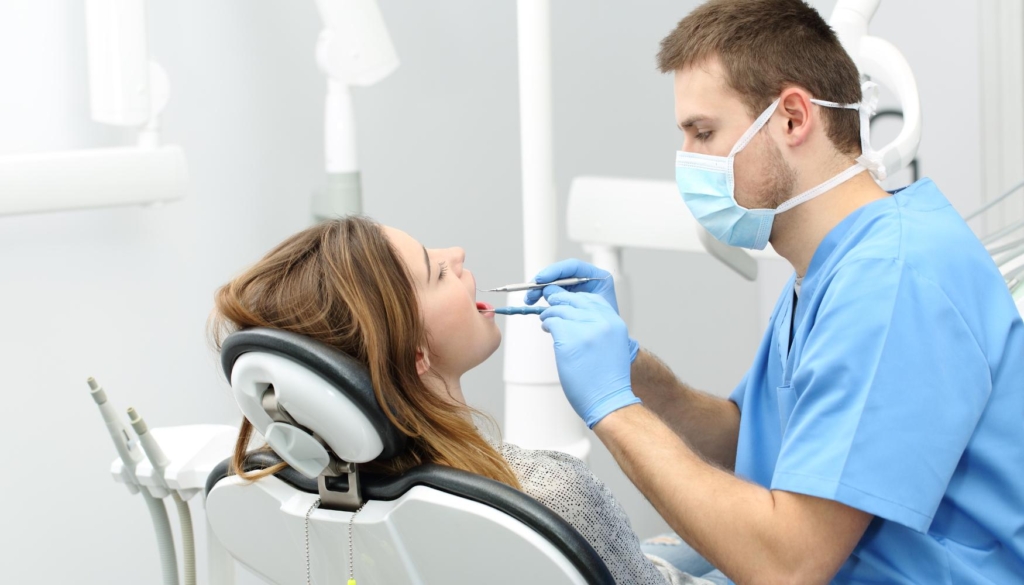Dentin Hypersensitivity: Symptoms, Causes, and Treatments for Sensitive Teeth
Dentin hypersensitivity is like having a pebble in your shoe.
At first, it seems like nothing, just one small thing you feel occasionally. So what? You can’t bite directly into ice cream or take your coffee nuclear hot anymore. You can live with that.
You keep making small concessions to compromise with the pain and discomfort as time goes on. Eventually, your dentin hypersensitivity is no longer just triggered by really hot or cold stimuli, but by every bite you take.
What causes tooth sensitivity? What can you do to prevent it? And what treatment options are available?
In this article, we’ll get to the root of the problem and what to do when it comes to dentin hypersensitivity.
Table of Contents
- What Is Dentin Hypersensitivity?
- Dentin Hypersensitivity Symptoms: What To Look Out For
- Can a Dentist Fix Dentin Hypersensitivity?
- 5 Tips That May Help Prevent Dentin Hypersensitivity
- Mint Dental Works: Providing Care to Our Patients in Portland’s LEED Certified Dental Facility

What Is Dentin Hypersensitivity?
What exactly is dentin and what is its purpose?
Teeth consist of four main components: enamel, cementum, dentin, and pulp.
The enamel is the outer layer of teeth, the cementum is the barrier between the enamel and dentin, dentin supports the enamel and transmits impulses to the pulp, and the pulp is the neurovascular bundle that keeps the tooth alive.
Since dentin is the part of our tooth responsible for stimuli response sensed by dental nerves, it is sensitive. Dentin hypersensitivity (DH) is a condition where the dentin has become overly sensitive to thermal and chemical stimuli causing pain and discomfort.
Experts speculate that up to 57% of adults suffer from this condition with a rising prevalence.
What Is the Most Common Cause of Dentin Hypersensitivity?
As we age, our teeth can become more sensitive. A common cause of dentin hypersensitivity is due to enamel and cementum erosion. Without these two outer dental layers, the dentin becomes overexposed and hypersensitive.
Gingival recession, or gum recession, is another routine cause of dentin hypersensitivity. When your gums recede they may expose parts of your root surface your enamel does not cover dentin, causing overstimulation.
Other causes of tooth hypersensitivity may include:
- Tooth decay
- Worn fillings
- Broken teeth
- Lifestyle factors
Dentin hypersensitivity may also be a temporary symptom associated with recovery from dental procedures like a filling or a crown. Speak to your dentist if you’re experiencing hypersensitivity that lingers long after a procedure.
Extra Risk Factors to Consider
Your oral health, hygiene practices, and diet can impact your risk of developing dental hypersensitivity.
DH is a common result of gum and tooth disease that can be caused by a lack of oral care or genetics. Overconsumption of highly acidic or sugary food and drink may also cause tooth enamel to wear or put you at risk for tooth decay.
Improper oral care like brushing too hard or using overly abrasive oral products can cause enamel and gum tissue to erode leading to dentin exposure. Using an electric toothbrush with soft bristles can help ensure you are not brushing too hard.
Teeth grinding may also cause dentin to become exposed. If you suspect you are grinding your teeth at night, be sure to chat with your dentist about getting fitted for a mouth guard to prevent enamel erosion.

Dentin Hypersensitivity Symptoms: What To Look For
Dentin Hypersensitivity is more than your average tooth sensitivity.
It’s extreme.
So extreme even a cold breeze could cause tooth discomfort. The pain is like a short burst when pressure or hot/cold food or drink comes in contact with your teeth. The most common trigger for DH is cold, with 75% of patients reporting discomfort from the application of a cold stimulus.
DH might cause you difficulty when consuming sugary or acidic foods/drinks like:
- Soda
- Candy
- Citrus fruits
- Vinegar
You may even find it painful to brush your teeth or use certain oral products like abrasive toothpaste or mouthwash. If your hypersensitivity is severe, you may even find that loud sounds or jarring movements can cause your teeth to hurt.
Can a Dentist Fix Dentin Hypersensitivity?
A dentist can diagnose your dental hypersensitivity, and then begin to develop your care, prevention, and treatment plan.
But unfortunately, there is no way to fully restore enamel.
Depending on the severity of your dentin hypersensitivity, your dentist may recommend anything from preventative measures to periodontal surgery. These treatments will help reduce pain and discomfort, but changes in dental routine and diet may be needed to prevent further changes to your dentin and enamel.
Dentin Hypersensitivity Treatment
While enamel loss is permanent, you can help remineralize your existing enamel before it erodes further. For patients with minor dentin hypersensitivity, your dentist may recommend an over-the-counter potassium nitrate desensitizing toothpaste or a prescription fluoride toothpaste.
For moderate cases, your dentist may perform a fluoride gel procedure to strengthen enamel. A crown or filling may also be used to fill areas where dentin is exposed.
For severe cases, where the dentin is fully exposed due to gum recession, your dentist may recomend a gum graft. If the cause of your dentin hypersensitivity is due to acute tooth decay or a damaged tooth, a root canal may be needed.
At Mint Dental Works, we understand that dentin hypersensitivity can be excruciating. This is why we offer innovative, high-tech services that may help alleviate the pain associated with your dentin hypersensitivity.
With our cutting-edge technologies, we can provide our patients with:
- Excellent diagnostic tools
- More predictable results
- Shorter visits
- A more comfortable dental experience
Our practice is a one-stop shop. We offer a full range of dental services all under one roof. Whatever service or treatment you need to reduce discomfort caused by DH, our licensed professionals can perform.
5 Tips That May Help Prevent Dentin Hypersensitivity
#1: Excellent Dental Hygiene
Oral hygiene is a necessary step in preventative care when avoiding dental and gum diseases that can lead to dentin hypersensitivity.
To practice excellent dental hygiene it is recommended that you:
- Brush a minimum of twice a day for two minutes each time
- Floss once a day and;
- Use a therapeutic mouth rinse at least once a day
It is important that you brush and floss.
Studies have suggested that brushing alone may only clean up to 60% of plaque off of your teeth and flossing may clean that other 40%. The bacteria in plaque can cause decay and love to live in hard-to-reach places that a toothbrush alone may not reach.
Use products that are high in fluoride. If you are not sure what product would be best, ask your dentist.
While good oral hygiene is required to maintain dental health, improper hygiene practices could cause your enamel to erode and worsen your dentin hypersensitivity.
#2: Brushing Correctly
Use the correct brush.
Use the softest bristle brush you can find for sensitive teeth and gums. An electric toothbrush may help you gently brush your teeth without losing efficiency. Be sure to replace your toothbrush or toothbrush head every 2-3 months.
Use a gentle, but effective, brushing technique.
Brush for two minutes, dividing each region of your mouth as upper left, upper right, lower left, and lower right. Spend 30 seconds on each section.
Angle the brush 45 degrees towards your gums. Make gentle circular motions. Avoid brushing too hard or too fast. Be sure to brush your tongue before you finish as our tongues hold a lot of bacteria.
#3: Avoiding Chemical Products
Avoid teeth-whitening products.
If you have dentin hypersensitivity, at home teeth whitening products could exacerbate symptoms. Avoid toothpaste or mouthwash with “whitening ingredients” that contain peroxide as it may worsen sensitivity.
Check the ingredients of your mouthwash and toothpaste.
Choose a toothpaste with fluoride and potassium nitrate and avoid strongly abrasive toothpastes and mouthwash. Check your toothpaste’s Relative Dentin Abrasivity (RDA) value to determine how abrasive it is. The American Dental Association recommends using toothpaste that is at or below 250 RDA.
Abrasive ingredients in dental products you may want to avoid include:
- Charcoal
- Chalk
- Peroxide
- Diethanolamine (DEA)
- Titanium oxide

#4: Avoiding Certain Foods and Drinks
Diet can have a direct impact on the development of oral health. Certain foods may further damage enamel, trigger dentin hypersensitivity, or increase the risk of developing tooth decay or gingival disease.
Foods to limit or avoid to prevent or lessen the pain from DH can include:
- Candy
- Ice cream
- Processed foods
- Tomatoes
- Citrus
- Pickled foods
Drinks that you may want to limit or avoid to reduce the discomfort caused by DH might include:
- Wine and other types of alcohol
- Soda
- Juice
- Coffee
- Tea
If you choose not to avoid certain foods or drinks, swishing your mouth may help remove acidic residue. Consuming beverages through a straw may also reduce some of the contact caffeinated or sugary drinks have with enamel.
If you’d like to add foods to your diet that can support your oral health, consider consuming foods that are high in calcium and rich in fiber like:
- Dairy products
- Whole grains
- Green vegetables
- Kidney beans
#5: Regular Dental Appointments
Regular dental appointments are necessary to maintain oral health. Professionals recommend getting your teeth cleaned and inspected every six months.
According to the CDC, more than 1 in 4 (26%) adults in the United States have some form of untreated tooth decay. Nearly half of adults age 30 or older (46%) show early signs of gum disease while severe gum disease affects 9% of adult U.S. citizens.
Nearly 68.5 million people in the United States do not have dental insurance. These numbers may significantly impact the rise of tooth decay and periodontal disease causing more Americans to suffer from DH.
Don’t let your finances limit your access to dental treatment. At Mint Dental Works in Portland, we offer financial options for those without dental insurance.
Mint Dental Works: Providing Care to Our Patients in Portland’s LEED Certified Dental Facility
Like a pebble in your shoe, dentin hypersensitivity can seem like nothing big at first, but as time goes on that pain can become intolerable.
If you are suffering from dental hypersensitivity in the Portland area, Mint Dental Works may be able to provide you with the care and expertise needed to reduce the effects of DH.
We are an LEED (Leadership in Energy and Environmental Design) certified dental facility that is dedicated to providing the highest quality of care with leading-industry technology.
What does that mean for our patients?
Our mission is to provide exceptional and comprehensive care that prioritizes the patient while maintaining environmental sustainability. Whether you need treatment for your dentin hypersensitivity, a smile makeover, or any other dental needs — your teeth will be in good hands.
Contact us to explore services and treatment options.
The content in this blog is not intended to be a substitute for professional medical advice, diagnosis, or treatment. Always seek the advice of your physician or other qualified health provider with any questions you may have regarding a medical condition.

